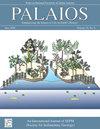TAPHOGRAPH: A SPREADSHEET METHOD TO GRAPHICALLY CHARACTERIZE THE TAPHONOMY OF SKELETAL PARTICLES
IF 1.5
4区 地球科学
Q2 GEOLOGY
引用次数: 0
Abstract
abstract: Taphonomic analysis is a useful tool to assess the intensity of alteration of skeletal remains and to help characterize depositional conditions as well as completeness and resolution of fossil assemblages. We herein introduce TAPHOGRAPH, an Excel spreadsheet script (a R code is also available), for the production of taphonomic diagrams to characterize the taphonomy of skeletal remains. The graphical representation depicts four taphonomic factors (fragmentation, abrasion, bioerosion, and encrustation) as a cumulative curve that allows visualization and comparison of the degree and variability of taphonomic alteration for different hard part types from one or more samples in a single diagram. The TAPHOGRAPH methodology is highly flexible, and can be used to assess the relative influence of mechanical versus biological (versus chemical) taphonomic alteration. The TAPHOGRAPH approach can guide inferences about hydraulic regimes, residence time at the seafloor, and intensity of different taphonomic processes.膜片法:一种电子表格方法,以图形方式表征骨骼颗粒的膜片
埋藏学分析是评估骨骸蚀变强度、表征沉积条件以及化石组合完整性和分辨率的有效工具。我们在此介绍TAPHOGRAPH,一个Excel电子表格脚本(R代码也可用),用于生成地形图,以表征骨骼遗骸的地形图。图形表示将四个埋藏因子(破碎、磨损、生物侵蚀和结壳)描绘成一个累积曲线,从而可以在单个图表中可视化和比较不同类型硬部件的埋藏变化程度和可变性。TAPHOGRAPH方法非常灵活,可用于评估机械与生物(与化学)地形学变化的相对影响。TAPHOGRAPH方法可以指导推断水力制度,在海底停留的时间,以及不同埋藏过程的强度。
本文章由计算机程序翻译,如有差异,请以英文原文为准。
求助全文
约1分钟内获得全文
求助全文
来源期刊

Palaios
地学-地质学
CiteScore
2.80
自引率
12.50%
发文量
40
审稿时长
6 months
期刊介绍:
PALAIOS is a monthly journal, founded in 1986, dedicated to emphasizing the impact of life on Earth''s history as recorded in the paleontological and sedimentological records. PALAIOS disseminates information to an international spectrum of geologists and biologists interested in a broad range of topics, including, but not limited to, biogeochemistry, ichnology, paleoclimatology, paleoecology, paleoceanography, sedimentology, stratigraphy, geomicrobiology, paleobiogeochemistry, and astrobiology.
PALAIOS publishes original papers that emphasize using paleontology to answer important geological and biological questions that further our understanding of Earth history. Accordingly, manuscripts whose subject matter and conclusions have broader geologic implications are much more likely to be selected for publication. Given that the purpose of PALAIOS is to generate enthusiasm for paleontology among a broad spectrum of readers, the editors request the following: titles that generate immediate interest; abstracts that emphasize important conclusions; illustrations of professional caliber used in place of words; and lively, yet scholarly, text.
 求助内容:
求助内容: 应助结果提醒方式:
应助结果提醒方式:


